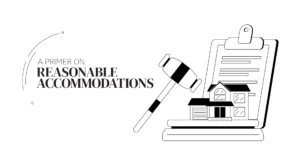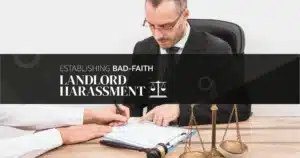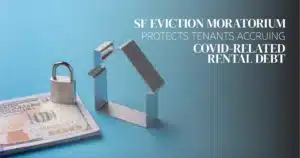Imagine it’s the end of the month, and your rent is due. You’ve lived in your apartment for a long time, but suddenly, your landlord tells you your rent will go up. You don’t think this is fair. You ask questions, but you only get vague answers. Something feels off.
Then there’s the noise. Your neighbors hold loud parties every night. You complain to your landlord, but they ignore you. You feel stressed, and it’s affecting your mental health. You’ve emailed, called, and even knocked on their door, but nothing changes.
Now, your lease is almost up. You have a gut feeling that your landlord wants you out. They might be trying to push you away.
So, what should you do? You Google “renters attorney near me.” But you wonder if this is even worth it. Do you really need a lawyer?
In this post, we will review five signs that you need a renters attorney near you right now. You’ll discover how an attorney can help protect your rights and solve tough problems, bringing you the relief you need. Let’s get started.
1. Is Your Rent Going Up Unfairly?
Finding out your rent is going up can feel awful. But is it even legal? Let’s figure this out.
California’s Rent Control Law
California passed the California Tenant Protection Act (AB 1482) in 2019. This law stops landlords from raising rent too much. They can increase it by only a small amount each year—usually 5% or $100, whichever is less, plus local inflation. But not all apartments are included. Some new buildings and government-subsidized units might be different. You must understand the specifics of this law to know if your situation falls under its protection.
Landlords must also give proper notice before raising rent. If it’s a big increase (more than 10%), they must tell you 90 days in advance. For smaller increases (less than 10%), it is only 30 days.
What You Should Do?
Call a local attorney if your landlord raises your rent too much or doesn’t give enough notice. They can help you understand your rights and see if the increase is legal.
Why Ignoring Rent Issues is Risky
You might pay too much if you don’t pay attention to the problem. It’s crucial to learn your rights. If the rent increase isn’t legal under California law, fight back! An attorney can spot these violations and help you, giving you the confidence that comes with knowing your rights.
2. Your Landlord Ignores Your Noise Complaints
It’s late at night, and the neighbors are partying again. You’ve done everything—knocked on doors, sent emails, and called your landlord. But nothing changes. Why isn’t your landlord helping?
The Common Struggle
Ronda Kaysen wrote about this issue in The New York Times. Many tenants feel frustrated when landlords ignore noise complaints. Most landlords don’t act because they think it’s not their job. They may fear losing tenants or causing conflict.
What’s the Deal?
Kaysen highlights that landlords must ensure tenants can enjoy their homes. If your landlord ignores your noise issues, they’re not following the law. You deserve peace in your home.
How to Get Help
You don’t have to suffer in silence. A renters attorney can tell you how to escalate noise complaints. They can help you take legal action against your landlord to enforce your rights. You may even be able to get compensation for your trouble.
3. Unfair Eviction? Get Legal Help
You’ve received an eviction notice and think it’s unfair. Maybe your landlord is using a trick to kick you out. What should you do next?
A Real-Life Case
In Delisi v. Lam (2019), a landlord tried to evict a tenant for personal use. However, they served another eviction notice shortly after for a different unit. The court found this action illegal and awarded the tenant a hefty sum for damages. This case shows that courts protect tenants from wrongful eviction.
Your Rights Matter
Delisi v. Lam highlights that eviction laws are strict for a reason. If your landlord doesn’t follow eviction law, they violate your rights. A renters attorney can assist you in challenging your eviction.
What You Can Do
Gather all your communication with your landlord and document everything. An attorney can help you navigate this difficult situation and fight for your right to stay in your home.
4. Don’t Ignore Problems in Your Apartment
Your apartment has big issues—like a leaky roof or mold—but your landlord isn’t fixing them. You have reported it, but nothing happens. Should you consider legal help?
Key Case to Know
In Green v. Superior Court (1974), the court decided that landlords must keep their properties livable. The tenant was allowed to withhold rent because the landlord didn’t make necessary repairs. This case set an important rule: landlords must maintain safe living conditions.
Why This Matters
The precedent set by Green v. Superior Court underscores a critical right: landlords must provide habitable housing. Your landlord is breaking the law if your apartment is unsafe or unlivable. You have the right to demand repairs.
How to Document Habitability Issues
Don’t rely on memory alone. Keep a record of all maintenance requests. Take photos of problems like leaks or mold. Save every email or message. This information is essential to take legal action against your landlord.
5. How to Get Your Security Deposit Back
You moved out, cleaned everything, and returned your keys. But your landlord refuses to give back your security deposit. They say you caused damage, but you know that’s not true. What should you do?
A Crucial Case
In Karole v. 340 West End Ave, LLC (2021), a tenant sued a landlord for withholding her deposit. The court sided with her because the landlord didn’t provide proof of any damages. She returned her money, showing that tenants can win these battles.
Your Rights in This Situation
The Karole case emphasizes that landlords must provide valid proof if they claim deductions from a security deposit. If your landlord keeps it without evidence, this isn’t fair. You have the right to fight for your money back.
Steps to Take
Before you move out:
- Document the apartment’s condition.
- Take photos and videos.
- Keep all receipts related to repairs you made.
If your landlord still withholds your deposit, consult an attorney. They can guide you through disputing false claims and help you reclaim your money. This process may involve providing evidence to counter the landlord’s allegations and potentially filing a lawsuit if necessary.
Get the Legal Help You Deserve
If you’ve read this post and find yourself nodding along, it’s time to get serious about your rights.
Leaving the above issues unaddressed can lead to more stress and financial loss. If you see these signs—like unfair rent hikes, ignored noise complaints, wrongful evictions, habitability problems, or security deposit disputes—it’s time to contact a local renters attorney. They can protect your rights and help you navigate challenges with your landlord.
Don’t hesitate to seek help; your home and well-being are worth it! Call The Law Firm for Tenant Rights, Inc. for a consultation and get the justice you deserve!






